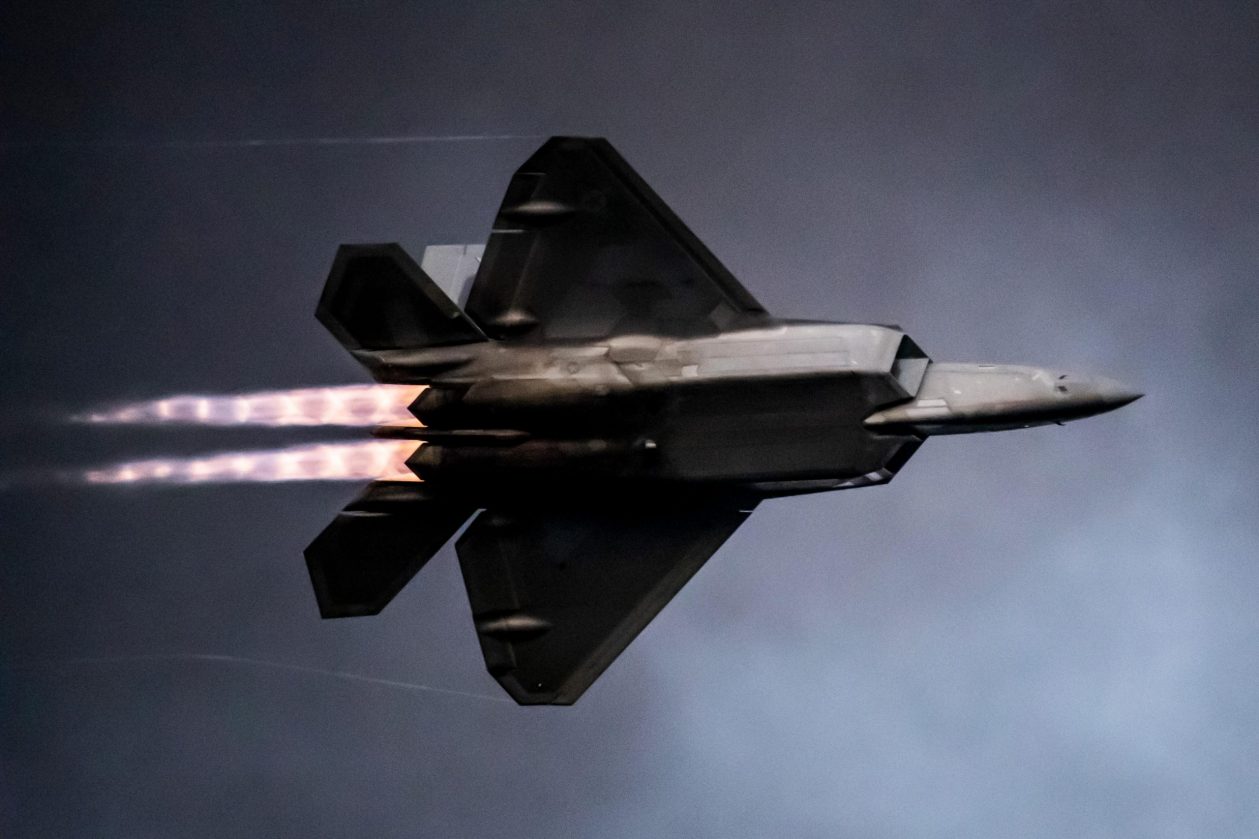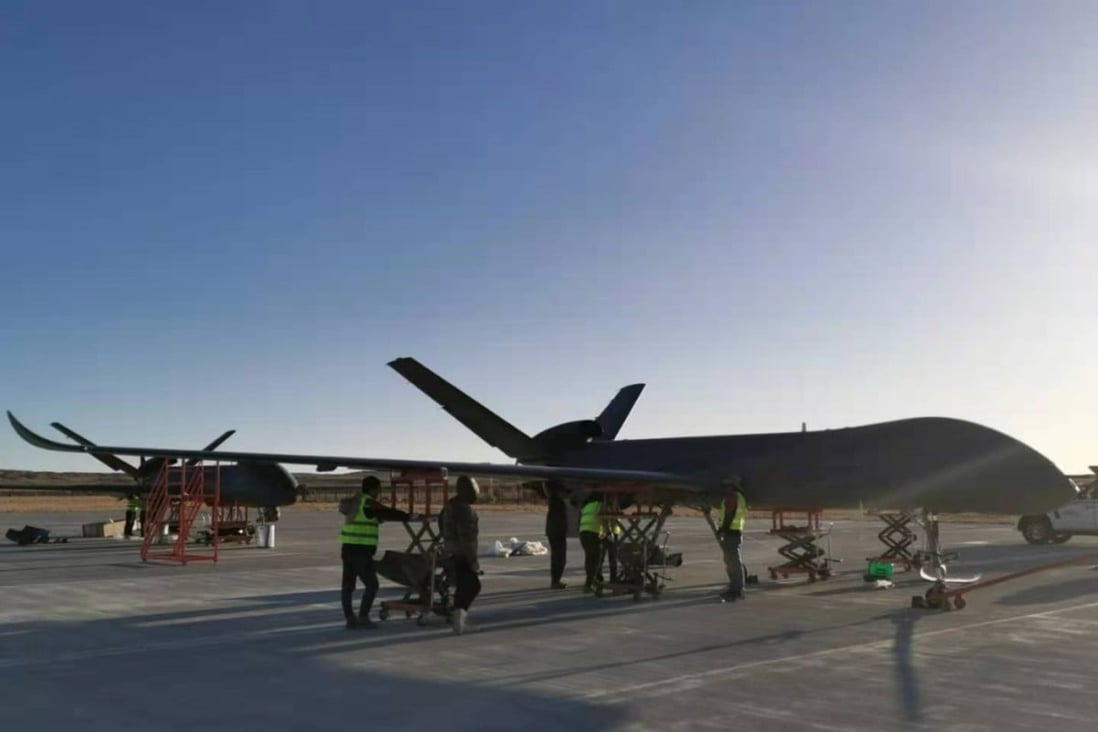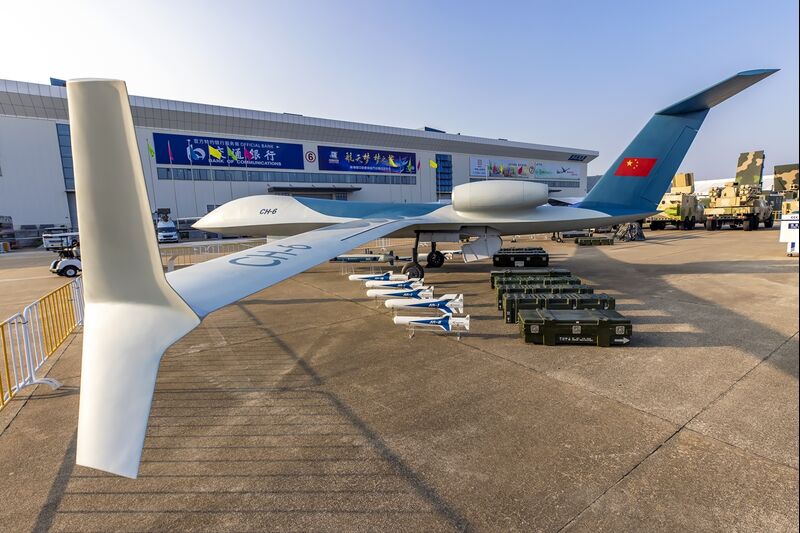Americans are so amusing.
For years they went around saying the ocean is a big place and their carriers and ships can roam about and hide.
Then slowly it sunk into their heads China got lots of drones.
Like Divine Eagles
According to Popular Science, China’s Divine Eagle UAV has a maximum altitude of 25km (or 79,000 feet).
In contrast, the US Global Hawk has a maximum altitude of only 18km (or 57,000 feet).
And Chinese Soar Dragon XiangLong
ANOTHER BIG BIRD
The 7-10 ton Xianglong, or WZ-7, with some stealthy features, would make an ideal EW drone thanks to its huge size, and lone endurance. Its unique 20 meter joined tandem wings increase its range and on station time.
China’s long-endurance Feilong-1 drone is ready for high-altitude missions
View attachment 832417
WZ-8 drones are hypersonic and fly very high and see very very far.
The CH-6 unmanned aerial vehicle at the airshow in Zhuhai.Source: VCG/Getty Images
By
Katrina Nicholas
A high-altitude, long-endurance drone that can fly for around 20 hours and reach top speeds of 700 kilometers an hour (435 miles an hour) was one of the flying gadgets unveiled at Airshow China 2021 in the southern city of Zhuhai on Tuesday.
Developed by
Aerospace CH UAV Co., the CH-6 drone is aimed at high-end arms use while its long flying range means it could be used for a variety of military and civilian missions.
It can also carry out anti-submarine missions, maritime patrols, early warning missions and close-range air support, China’s Global Times
said.
China Successfully Tests Solar-Powered Drone Capable of Being Airborne for Months
View attachment 832436
A previous version test-flown in September managed to remain afloat for five hours, with the latest flight indicating months-long capabilities.
BY
MARCO MARGARITOFF NOVEMBER 4, 2018
China successfully tested its solar-powered Morning Star drone supposedly capable of being airborne for months at a time,
according to Business Insider.
The Developer Aviation Industry Corporation of China (AVIC) had already test-flown the unmanned aerial vehicle in September, albeit with a smaller wingspan. This latest flight utilized a 66-foot (20-meter) wingspan version weighing 42 pounds (18.9kg) aimed to reflect the final model. The test flight saw the drone reach and maintain a cruising altitude of over 66,000 feet (20,000 meters).
“With the development and first flight, in addition to a great number of ground, wind tunnel and scale model tests…a solid foundation has been laid for follow-up development,” said AVIC. “We will move quickly towards large-scale, heavy load and long endurance solar-powered UAVs.”
And not to forget
Maritime Militia
The Maritime Militia, the first line of defense, counts one-hundred eighty-thousand ocean-going fishing boats and four thousand merchant
[7] freighters, some towing sonar detectors, crewed by a million experienced sailors transmitting detailed information around the clock on every warship afloat. Their intelligence goes to shore bases that fuse their reports with automated transmissions from Beidou satellites and forward the data to specialists operating ‘vessel management platforms,’ collating, formatting, and sending actionable information up the PLAN command chain.
And sonar buoys all withing Western Pacific ocean. Supposed to be listening to fishes, but can also hear clearly screws of ships turning away.
China got the most super computers of the world. And the supercomputers will be putting all those data to know every second what ships are heading and speed they at.
American now know for sure their carriers and ships are pin pointed and can run but cannot hide unless they hide in Frisco Bay or Hudson Bay.
And Americans know for sure that DF21s and DF26 can do what they supposed to do, hit moving ships.
The target ship was moving, and was a lot lot smaller than a 100,000 carrier. Which made the hit by DF21 and DF26 equivalent to a pin point hits on the apricot, or medulla oblongata. Like bullets from 2 separate snipers hitting the medulla oblongata simultaneously.
The test could represent the first full demonstration of a real Chinese long-range anti-ship ballistic missile capability.

www.thedrive.com

Chinese Long-Range Ballistic Missiles Struck Moving Ship In South China Sea: Report
The test could represent the first full demonstration of a real Chinese long-range anti-ship ballistic missile capability.
BY
JOSEPH TREVITHICK NOVEMBER 16, 2020
At least some of the ballistic missiles that China's People's Liberation Army fired into the South China Sea during an exercise earlier this year, which you can read about more in the
War Zone's
initial story on those drills, reportedly hit a moving target ship. If true, this would be the country's first known demonstration of an actual long-range
anti-ship ballistic missile capability, which could significantly change the operational calculus for any potential opponent, including the United States, in the disputed maritime region and elsewhere in the Pacific.
The
South China Morning Post reported last week that Wang Xiangsui, a retired People's Liberation Army (PLA) officer, had said that one
DF-26B intermediate-range ballistic missile (IRBM) and one
DF-21D medium-range ballistic missile (MRBM) had struck the target vessel as it sailed near the Paracel Island chain during the August exercise. Wang, who has been described as "
well-connected" in the past, is best known as one of the co-authors of the 1999 book
Unrestricted Warfare, which covered
various asymmetric means to undermine and defeat countries that were technologically superior to China. It has become a
highly influential text, and
general concept, in national security circles.
"We launched the DF-21 and DF-26, and the missiles hit a vessel sailing south of the Paracel Islands," Wang said during a closed-door gathering in China's eastern Zhejiang province in October, according to the
South China Morning Post. “Shortly after that, an American military attaché in Geneva, [Switzerland] complained and said it would lead to severe consequences if the missiles hit an American aircraft carrier. They see this as a show of force. But we are doing this because of their provocation."
Wang does not appear to have given any details about the target ship, its construction, how fast it might have been moving, or how the PLA may have cued the missiles their target.
It remains unclear exactly how many missiles the PLA fired during the exercise on Aug. 26.
South China Morning Post's
initial report had indicated that two weapons had been launched, one DF-26B and one DF-21D, from sites in China's northwestern Qinghai province and in Zhejiang, respectively.
USA fanboys then come about foaming at the mouth that should their precious carriers be hit, they use nukes.
They think China got measly 200++ nukes.
Just like the 5000 km China underground GREAT WALL, contain only piddling 200++ nukes?
USA not realising China nukes are thermonuclear nukes and immediately usable as Chinese nukes are done to YuMing configuration.
USA must think why with only 200++ nukes, China can fire off 2000++ warheads express delivery via DF5 , DF31AG, DF-41 and JL2 and JL3 and much more.
Perhaps they think most of the warheads are delivering dim sum, sweet and sour chicken and tea bags.
Should USA fire just one nuke at China or chinese forces, all the USA bases in Japan and Okinawa and Singapore and Diego Garcia and in USA be turned into seas and lakes of multicolor glass.
None of USA carriers will be safe even if the USA carriers try to hide in Hudson Bay or Frisco Bay.
USA want to play stupid games with phony FONOPs.
USA will win stupid prize.






















